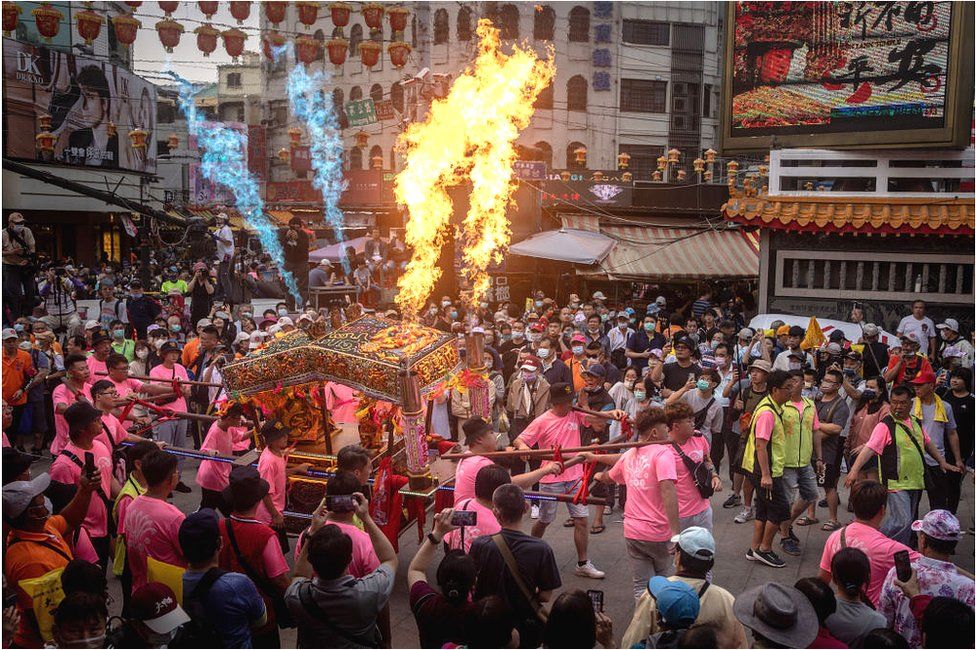-

-
-
Loading

Loading

Every year, Chang Ke-chung travels from Taiwan to China to fulfill a sacred duty. He is a follower of Mazu, a sea goddess worshipped by millions in Taiwan and ethnic Chinese communities worldwide. The pilgrimage to Mazu's home temple in Meizhou, southern China is a crucial expression of faith for these worshippers. Chang feels a deep connection to China, describing it as his own country. This relationship between Taiwan and China puts Taiwanese worshippers in the middle of a political struggle, especially with upcoming elections. Many people in Taiwan worship Mazu and other folk deities with Chinese roots, leading to strong religious ties between Taiwan and China. The Chinese Communist Party encourages these temple groups to visit the mainland to increase identification between Taiwan and China. Beijing hopes that the more Taiwanese identify with China, the higher the chances of "peaceful reunification." China allows and facilitates these visits through the United Front Work Department, which controls religious affairs. Chinese officials personally welcome Taiwanese temple groups and call for stronger ties and more exchanges. Some experts express concerns about China's growing influence over these groups. Most Taiwanese temples are not officially registered or transparent about their finances, making it difficult to track funding sources. Some worry that this makes them vulnerable to potential funding from the People's Republic of China. There have been calls for stricter regulation and financial scrutiny of temples. China uses religious lineages to support the narrative of unification, with "homecoming" and "both sides of the Taiwan Strait are one family" as central themes in cross-strait religious exchange events, according to religion and politics expert Chang Kuei-min. The Mazu community is of particular interest to Beijing due to its size, estimated to be about 60% of Taiwan's population. Beijing sees Mazu's maternal figure as a way to attract Taiwanese people and increase identification with China. The Taiwanese government has been concerned about the influence of China over its religious community for a long time. The first controversy arose in 1987 when a prominent Taiwanese Mazu temple group traveled to Meizhou during a time of no formal contact between Taipei and Beijing. The Taiwanese government has become more suspicious as more Taiwanese devotees visit Meizhou every year. While Taiwan allows religious freedom, it is reluctant to clamp down on cultural exchanges with China. However, it has recently increased warnings about Chinese influence ahead of the upcoming election. The government banned a Chinese delegation from participating in a key event in the Mazu religious calendar due to concerns about Beijing's influence. Temple leaders with close ties to China deny any wrongdoing, stating that they are helping cross-strait cultural exchanges. However, some members of Taiwan's religious community are skeptical and view it as a way for China to push for unification. They worry about being associated with suspicious activities and being targeted. The Democratic Progressive Party (DPP) government risks alienating a significant voter base as they try to combat Chinese influence in Taiwan. Temples hold a crucial place in Taiwanese society, with two-thirds of the population following folk religions, Buddhism, and Taoism. Visiting temples and participating in religious events is essential for politicians during elections. The DPP government is already facing backlash for targeting religious communities, leading to less trust in the Taiwanese government. Some worshippers feel they are being treated hypocritically. They criticize politicians for criticizing them while seeking their votes. Others believe that China's tactics to influence elections must be closely monitored, and maintaining exchanges with China is important for Taiwan's economy. Despite concerns about China's influence, some believe that strengthening Taiwan is the key to overcoming these challenges.